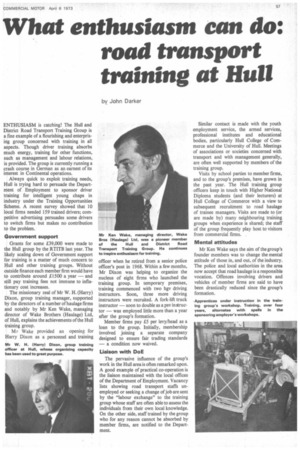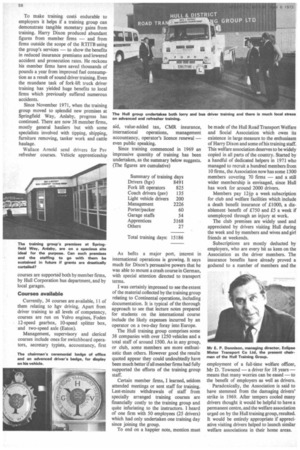What enthusiasm can do: road transport training at Hull
Page 59

Page 60

If you've noticed an error in this article please click here to report it so we can fix it.
by John Darker ENTHUSIASM is catching! The Hull and District Road Transport Training Group is a fine example of a flourishing and enterprising group concerned with training in all aspects. Though driver training absorbs much energy, training for other functions, such as management and labour relations, is provided. The group is currently running a crash course in German as an earnest of its interest in Continental operations.
Always quick to exploit training needs, Hull is trying hard to persuade the Department of Employment to sponsor driver training for intelligent young chaps in industry under the Training Opportunities Scheme. A recent survey showed that 10 local firms needed 159 trained drivers; competitive advertising persuades some drivers to switch firms but makes no contribution to the problem.
Government support Grants for some £39,000 were made to the Hull group by the RTITB last year. The likely scaling down of Government support for training is a matter of much concern to Hull and other training groups. Without outside finance each member firm would have to contribute around £1500 a year — and still pay training fees not immune to inflationary cost increases.
The missionary zeal of Mr W. H. (Harry) Dixon, group training manager, supported by the directors of a number of haulage firms and notably by Mr Ken Wake, managing director of Wake Brothers (Haulage) Ltd, of Hull, explains the achievements of the Hull training group.
Mr Wake provided an opening for Harry Dixon as a personnel and training officer when he retired from a senior police officer's post in 1968. Within a few months, Mr Dixon was helping to organize the nucleus of eight firms who launched the training group. In temporary premises, training commenced with two hgv driving instructors. Soon, three more driving instructors were recruited. A fork-lift truck instructor — soon to double as a psv instructor — was employed little more than a year after the group's formation.
Member firms pay £5 per levy/head as a loan to the group. Initially, membership involved joining a separate company designed to ensure fair trading standards — a condition now waived.
Liaison with DoE The pervasive influence of the group's work in the Hull area is often remarked upon. A good example of practical co-operation is the liaison maintained with the local offices of the Department of Employment. Vacancy lists showing road transport staffs unemployed or seeking a change of job are sent by the "labour exchange" to the training group whose staff are often able to assess the individuals from their own local knowledge. On the other side, staff trained by the group who for any reason cannot be absorbed by member firms, are notified to the Department. Similar contact is made with the youth employment service, the armed services, professional institutes and educational bodies, particularly Hull College of Commerce and the University of Hull. Meetings of associations or societies concerned with transport and with management generally, are often well supported by members of the training group.
Visits by school parties to member firms, and to the group's premises, have grown in the past year. The Hull training group officers keep in touch with Higher National Diploma students (and their lecturers) at Hull College of Commerce with a view to subsequent recruitment to road haulage of trainee managers. Visits are made to (or are made by) many neighbouring training groups when experience is shared; the staff of the group frequently play host to visitors from commercial firms. .
Mental attitudes Mr Ken Wake says the aim of the group's founder members was to change the mental attitude of those in, and out, of the industry. The police and local authorities in the area now accept that road haulage is a responsible vocation. Offences involving drivers and vehicles of member firms are said to have been drastically reduced since the group's formation. To make training costs endurable to employers it helps if a training group can demonstrate tangible monetary gains from training. Harry Dixon produced abundant figures from member firms — and from firms outside the scope of the RTITB using the group's services — to show the benefits in reduced insurance premiums and lowered accident and prosecution rates. He reckons his member firms have saved thousands of pounds a year from improved fuel consumption as a result of sound driver training. Even the mundane task of forklift truck driver training has yielded huge benefits to local firms which previously suffered numerous accidents.
Since November 1971, when the training group moved to splendid new premises at Springfield Way, Anlaby, progress has continued. There are now 38 member firms, mostly general hauliers but with some specialists involved with tipping, shipping, furniture removing, tanker work and cattle haulage.
Wallace Arnold send drivers for Psv refresher courses. Vehicle apprenticeship courses are supported both by member firms, by Hull Corporation bus department, and by local garages.
Courses available
Currently, 34 courses are available, 11 of them relating to hgv driving. Apart from driver training to all levels of competency, courses are run on Volvo engines, Foden 12-speed gearbox, 10-speed splitter box, and two-speed axle (Eaton).
Management, supervisory and clerical courses include ones for switchboard operators, secretary typists, accountancy, first aid, value-added tax, CMR insurance, international operations, management accountancy, operator's licence renewal — even public speaking.
Since training commenced in 1969 an impressive quantity of training has been undertaken, as the summary below suggests. (The figures are cumulative) Summary of training days Drivers (hgv) 8491 Fork lift operators 825 Coach drivers (psv) 135 Light vehicle drivers 200 Management 2226 Porter/packer 60 Garage staffs 54 Apprentices 3168 Others 27 Total training days: 15186 As befits a major port, interest in international operations is growing. It says much for Dixon's persuasive powers that he was able to mount a crash course in German, with special attention directed to transport terms.
I was certainly impressed to see the extent of the material collected by the training group relating to Continental operations, including documentation. It is typical of the thorough approach to see that lecture notes prepared for students on the international course include the likely expenses incurred by an operator on a two-day foray into Europe.
The Hull training group comprises some 3g companies with over 1250 vehicles and a total staff of around 1500. As in any group, or club, some members are more enthusiastic than others. However good the results quoted appear they could undoubtedly have been much better if all member firms had fully supported the efforts of the training group staff.
Certain member firms, I learned, seldom attended meetings or sent staff for training. Last-minute withdrawals of staff from specially arranged training courses are financially costly to the training group and quite infuriating to the instructors. I heard of one firm with 50 employees (25 drivers) which had only undertaken one training day since joining the group.
To end on a happier note, mention must be made of the Hull Road Transport Welfare and Social Association which owes its existence in large measure to the enthusiasm of Harry Dixon and some of his training staff. This welfare association deserves to be widely copied in all parts of the country. Started by a handful of dedicated helpers in 1971 who managed to recruit a hundred members from 10 firms, the Association now has some 1300 members covering 70 firms — and a still wider membership is envisaged, since Hull has work for around 2000 drivers.
Members pay 12fp a week subscription for club and welfare facilities which include a death benefit insurance of £1000, a disablement benefit of £750 and £5 a week if unemployed through an injury at work.
The club premises are widely used and appreciated by drivers visiting Hull during the week and by members and wives and girl friends at weekends.
Subscriptions are mostly deducted by employers, who are every bit as keen on the Association as the driver members. The insurance benefits have already proved a godsend to a number of members and the employment of a full-time welfare officer, Mr D. Townend — a driver for 18 years — means that many worries can be eased — to the benefit of employers as well as drivers.
Paradoxically, the Association is said to have stemmed from the damaging drivers' strike in 1969. After tempers cooled many drivers thought it would be helpful to have a permanent centre, and the welfare association urged on by the Hull training group, resulted. It would be entirely appropriate if appreciative visiting drivers helped to launch similar welfare associations in their home areas.












































































































